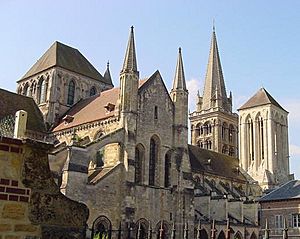Lisieux Cathedral facts for kids
Quick facts for kids Lisieux CathedralCathédrale Saint-Pierre de Lisieux |
|
|---|---|

Lisieux Cathedral from the northwest
|
|
| Religion | |
| Affiliation | Catholic |
| Province | Bishop of Lisieux |
| Region | Calvados |
| Ecclesiastical or organizational status | Cathedral |
| Status | Active |
| Location | |
| Location | Lisieux, |
| Architecture | |
| Architectural type | church |
| Groundbreaking | 12th century |
| Completed | 18th century |
Lisieux Cathedral, also known as Saint Peter's Cathedral in French (French: Cathédrale Saint-Pierre de Lisieux), is a Catholic church located in Lisieux, France. For a long time, it was the main church for the Bishop of Lisieux. However, in 1801, this special church area (called a diocese) was combined with another one, the Diocese of Bayeux.
Contents
History of Lisieux Cathedral
Early Beginnings and Romanesque Style
People believe there was a church here as early as the 500s. This is because a Bishop of Lisieux existed around that time. However, not much is known about this very old building.
A previous cathedral, built in the Romanesque style, was unfortunately burned down in 1136. This happened during a conflict involving Geoffrey of Anjou. The basic shape of the church, especially the front part, stayed the same.
Rebuilding and Gothic Changes
Bishop Arnulf began rebuilding the cathedral around 1160. He first made important repairs before starting the full reconstruction. He was so busy with this work that he missed a call to Rome from the Pope in 1144. He also found it hard to get enough money for the rebuilding later on.
It was once thought that Henry Plantagenet, who would become King of England, married Eleanor of Aquitaine here in 1152. But they actually got married in Poitiers Cathedral. In 1226, another fire damaged the cathedral. Bishop Guillaume Du Pont-de-L'Arche then added three small chapels to the back of the church during the repairs.
Later Additions and Survival
Pierre Cauchon, who was involved in the trial of Joan of Arc, became the Bishop of Lisieux in 1432. He is buried inside the cathedral. A new tower on the southwest side, with an early Gothic design, was built in 1553. This was needed after the old tower had fallen down.
The cathedral survived World War II completely unharmed. This is quite amazing, as the town of Lisieux itself suffered from Allied bombing in 1944.
What Lisieux Cathedral Looks Like
Size and Main Features
The cathedral is about 110 meters (360 feet) long. It is considered a national monument in France.
The front of the building has three main doorways. Above these doorways are two towers. The tower on the south side was built in the 1500s. At its very top, it has a tall, pointed spire (called a flèche) from the 1600s. Strong supports called buttresses were added to the south side of the church in the 1400s.
Architectural Styles
From the very beginning, the architect designed special arched ceilings and flying buttresses. These features made it one of the first Gothic buildings in the Normandy region.
The main part of the church, called the nave, looks quite simple. Its style was inspired by the Gothic buildings found in the Île de France area. However, the newer parts of the building, like the rounded end (the chevet), the central tower with windows (the lantern tower), and the western front, were built in the 1700s in a Norman style.
Music at the Cathedral
The Organ
The cathedral has a beautiful organ that was made by Aristide Cavaillé-Coll. It was installed during the 1800s and is still used for music today.
Gallery
See also
 In Spanish: Catedral de Lisieux para niños
In Spanish: Catedral de Lisieux para niños
- List of Gothic Cathedrals in Europe
- Basilica of Sainte-Thérèse, Lisieux
 | George Robert Carruthers |
 | Patricia Bath |
 | Jan Ernst Matzeliger |
 | Alexander Miles |



